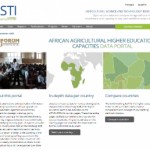The GCAN 2017-2021 summary provides an overview of highlights on research findings, tools, publications and other outreach materials and events produced under the Gender, Climate Change and Nutrition Integration Initiative during 2017 to mid-2021.
Summ... Source: Gender, Climate Change, and Nutrition Integration Initiative (GCAN)
Policy Note – The Gender and Social Dynamics of Resilience
This policy note recommends key areas of inquiry for assessing gender and social differences in resilience that can be used to inform, evaluate, and strengthen resilience programming. Grounded in the conceptual framework of GCAN, the note identifies and describes key gender issues related to resilience. Greater attention to heterogeneity in resilience forms the foundation for […] Source: Gender, Climate Change, and Nutrition Integration Initiative (GCAN)
ASTI and RUFORUM Launch new data portals for agricultural higher education in Africa
The International Food Policy Research Institute’s Agricultural Science and Technology Indicators (ASTI/IFPRI) and the Regional Universities Forum for Capacity Building in Agriculture (RUFORUM) have partnered to launch two new online data portals on agricultural higher education capacities in Africa south of the Sahara. The portals offer free, user-friendly data on teaching staff and student populations […] Source: Agricultural Science and Technology Indicators
New ASTI/AWARD portal supports women’s representation in African agricultural research
Women contribute important insights in agricultural research. Whether as government researchers, university professors, or senior research managers, their perspectives are essential for addressing the unique and pressing challenges of all farmers, particularly female farmers. Hiring women can also help alleviate staffing shortages in many African agricultural research agencies. These are a few of many good […]
New portal supports women’s representation in African agricultural research
Women contribute important insights in agricultural research. Whether as government researchers, university professors, or senior research managers, their skills and perspectives are essential for addressing the unique and pressing challenges of all farmers, particularly female farmers. In addition, recruiting from only male candidate pools hampers efforts by African agricultural research agencies to hire the best […] Source: Agricultural Science and Technology Indicators

